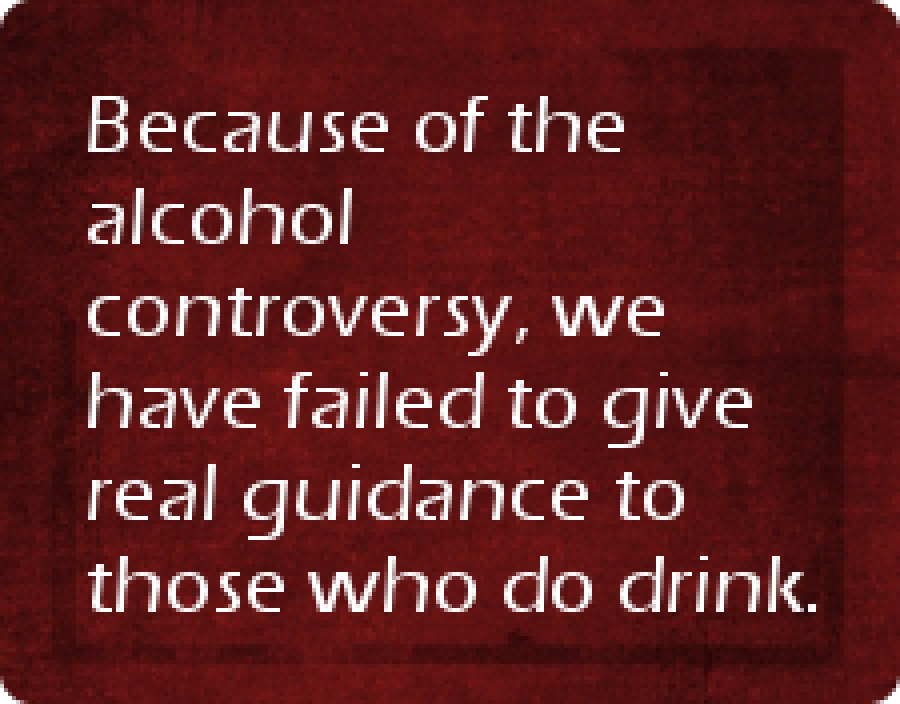Convictions and Complexities about Drinking
Image

Today I am going to take a stab at applying convictions and preferences to the subject of drinking. Let’s begin with convictions.
Convictions in General
A conviction is a belief or value we embrace as a crucial part of what we stand for and who we are. It is very different from a preference—or merely assenting to a belief or value.
For the believer, there are two levels of conviction. The first level—the deepest level—involves biblical conviction, although some deep convictions may extend beyond the Bible (e.g., a soldier surrendering his life for our country’s freedom). Our biblical convictions should be first and foremost. Where the Bible is emphatic, we must be clear and take a firm stand. This does not mean we must demand others to take that stand, but we certainly must urge fellow believers to follow what the Word actually says. This is not necessarily what we think it says, but what it actually says.
The difference between a biblical conviction and a preference is that we would suffer loss rather than disavow our biblical convictions. It may mean we lose a job, flunk a class, or be ostracized. In some nations, it means imprisonment or even death.
A preference, however, is something we prefer, but would not suffer for. For example, if we preferred to attend church Sunday mornings but lived in a culture where Friday was the national day off (as in a Muslim country), we could adjust and conduct church on Friday.
As our society becomes more aggressively anti-Christian, we are often disappointed to see supposed believers who (we thought had convictions) cave in. We discover that their “convictions” were actually preferences.
A lesser level of conviction involves beliefs that are not emphasized in the Bible; these are matters of conscience. Paul mandates we respect one another’s consciences in Romans 14:1-23 and I Corinthians 8:1-13.
Use of Alcohol, the Bible, and Evangelical/Fundamental History
Many Christians suggest that the Bible teaches moderation in drinking, while many others have concluded that the Bible teaches total abstinence. My suspicion is that the younger generations are more likely to embrace drinking, while the older generations oppose the idea.
Some of us choose to avoid alcohol—not because we believe it is wrong in moderation—but because it would be wrong for us. Take my case: I hail from a long line of alcoholics, including my father, uncles, and both grandfathers. I may have a genetic predisposition, so I am better off not getting into the habit.
How did abstinence and conservative evangelical/fundamental Christianity become paired together in the first place? In 1750, no Christians (to my knowledge) were against drinking in moderation. The Puritans, for example, would discuss theology while drinking ale. All churches used fermented wine for communion. How did things change?
Change began with the temperance movement. Evangelical Christians have a heritage of supporting the temperance movement of the early 20th century (that resulted in Prohibition). Because of the push against alcohol, a company named “Welch’s” began bottling unfermented grape juice—for communion use!
In addition, conservative evangelicals started rescue missions over 100 years ago—before the current secular “soup kitchens” caught on. People who have an alcoholic background are often brought down by just one drink, so our spiritual forefathers’ attempts at helping these people meant across-the-board abstinence for all church members. Some church covenants still require church members to totally abstain.
Today we battle all sorts of drug abuse, making substance abuse one of America’s premiere issues. Most people have concluded that Prohibition was a drastic mistake, and few of us are working with rehabilitated alcoholics. Like it or not, many Christians in America are now drinkers, at least on occasion. At the same time, we are completely free to abstain. We do not need to start drinking to prove with are with the times, free, or flexible!
When it comes to the Bible, alcohol use (in moderation) is the biblical example. The Greek word for unfermented wine (trux or trugia) is never used in the New Testament. Indeed, it is hard to imagine how someone could stumble over using grape juice (if that is what “wine” meant, as some claim) in Romans 14:21. A natural interpretation—and all Bible versions agree—tell us that Jesus turned the water to wine, not grape juice. We must pursue a biblical (rather than historical and agenda-driven) ethic.
Many Christians believe drinking alcohol is wrong, even in moderation. Others choose to abstain because of a logical argument (alcohol does more harm than good). Others take a moderation approach. But all of us need to be sensitive to others.
We do not allow alcohol at church events for good reason. Romans 14:21 (ESV) reads:
Do not, for the sake of food, destroy the work of God. Everything is indeed clean, but it is wrong for anyone to make another stumble by what he eats. It is good not to eat meat or drink wine or do anything that causes your brother to stumble.
Sometimes we need to adjust our habits based upon those around us, but only at the time. Otherwise we would all be abstainers and all vegetarians! Consideration for those who have sincere beliefs is a good thing; this is not the same as letting people with legalistic bents bully and impose their rules upon us.
Paul is talking about “weaker brothers” who would not be upset they didn’t get their way—but would be truly hurt—and perhaps emboldened to do things that bothered their consciences.
Moderation and Christian Alcoholics
Alcoholism within the Christian world is a genuine problem. Some people are typically driven toward excesses. Others (like Native American Indians) have a biological factor that makes alcohol highly addictive.
Drunkenness is a sin. Ephesians 5:18 says, “And do not get drunk with wine, for that is dissipation, but be filled with the Spirit” (NASB). The problem, though, is that most alcoholics (or occasional drunks) live in denial. One time, I knew a man who became so drunk he got in a fight with a fire hydrant. He lost. But he would talk about being able to “hold his liquor” and “not being drunk a day in his life.” The denial factor is strong.
Because we seem to have two polarized camps—drinking is always wrong or drinking is okay—we have failed to give real guidance to those who do drink.
So here is my attempt to do so. If you do drink, do you have to drink every single day? Or do you generally drink more than two or three drinks in a given day, or more than ten drinks a week? Are you safely within the boundaries of moderation? (For more information on defining moderation, see www.moderatedrinking.com.)
If you have a problem, you should elicit the prayer support of discreet members of our church family (like our elders, for example). There is no shame about enrolling in a treatment program or seeking Christian counseling.
All of us have our struggles; we all need the Holy Spirit to work within us through the Word, prayer, and relational involvement with our church family. Sometimes the best way to overcome sin is to focus upon loving God and loving others.
Ed Vasicek Bio
Ed Vasicek was raised as a Roman Catholic but, during high school, Cicero (IL) Bible Church reached out to him, and he received Jesus Christ as his Savior by faith alone. Ed earned his BA at Moody Bible Institute and served as pastor for many years at Highland Park Church, where he is now pastor emeritus. Ed and his wife, Marylu, have two adult children. Ed has published over 1,000 columns for the opinion page of the Kokomo Tribune, published articles in Pulpit Helps magazine, and posted many papers which are available at edvasicek.com. Ed has also published the The Midrash Key and The Amazing Doctrines of Paul As Midrash: The Jewish Roots and Old Testament Sources for Paul's Teachings.
- 653 views
Lee, I’ll see what I can do—where our “blind spots” are as a Christian culture ought to be of huge importance to us. And how do I get there logically? It’s simply that there will be disputable matters affecting faith that we might not have thought of. That is, after all, why Paul wrote Romans 14 and 1 Corinthians 8-10; because he wanted to alert believers to a need to honor the weaker brother and act in wisdom here.
And that’s why I’m with Dan on what Romans 14 is getting at; it is disputable matters, not little things, and they have to affect faith. If one carelessly yields to another believer under the impression that he has a “weak conscience”, one often consigns that person to a lack of growth in Christ because you’re “enabling” his weak skills at exegeting the Scripture.
Aspiring to be a stick in the mud.
[Bert Perry]…And that’s why I’m with Dan on what Romans 14 is getting at; it is disputable matters, not little things, and they have to affect faith. If one carelessly yields to another believer under the impression that he has a “weak conscience”, one often consigns that person to a lack of growth in Christ because you’re “enabling” his weak skills at exegeting the Scripture.
Why would you say, “weak skills at exegeting the Scripture”? That’s not something I would say about the weak. Consider “Days.” Vote here. Read here. Piper. I think you can be in the category of treating days one above another (“weak”) and be doing it for very Scriptural reasons.
[Dan Miller]Bert Perry wrote:
…And that’s why I’m with Dan on what Romans 14 is getting at; it is disputable matters, not little things, and they have to affect faith. If one carelessly yields to another believer under the impression that he has a “weak conscience”, one often consigns that person to a lack of growth in Christ because you’re “enabling” his weak skills at exegeting the Scripture.
Why would you say, “weak skills at exegeting the Scripture”? That’s not something I would say about the weak. Consider “Days.” Vote here. Read here. Piper. I think you can be in the category of treating days one above another (“weak”) and be doing it for very Scriptural reasons.
Because I am not speaking about people who have a clear, Biblically based reason to, say, avoid meat and wine sacrificed to idols, or who persist in celebrating the Jewish Holidays despite Christ having completed the Law for us. I am rather talking about a fairly significant population of people who use “Romans 14” as a way to pressure the church to follow their own personal cultural biases.
Genuine weak conscience? No problem, but quite frankly, I don’t see a lot of that in today’s church. And in the meantime, I think we’re missing some very real cases of idolatry in our society—our blind spots as it were.
Aspiring to be a stick in the mud.
[Bert Perry]…Genuine weak conscience? No problem, but quite frankly, I don’t see a lot of that in today’s church. …[/quote]
Now that is interesting. It’s my assertion that when Paul spoke of the “weak” or “weak consciences,” he was thinking of people who knew the Scriptures and were applying them. Perhaps that’s what you mean by “genuine.”
Now, in today’s church (throughout church history!), believers have been genuinely applying the Word. But we’ve never seen them make claims to be “weak,” not accept the commands given to the weak. Perhaps that’s what you don’t see a lot of?



Discussion